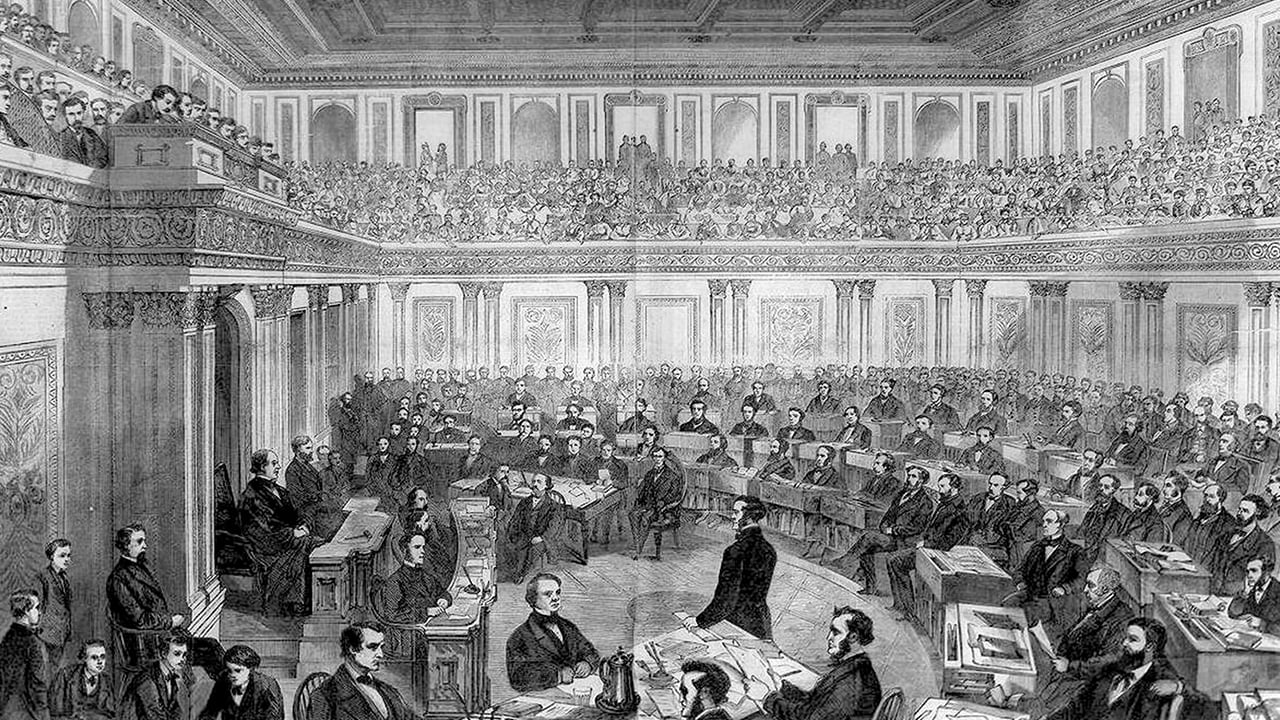
The House held its first hearing on the Biden impeachment this morning — finally! Entitled “The Basis for an impeachment inquiry of President Joseph R. Biden, Jr.,” the hearing was held by the House Committee on Oversight and Accountability chaired by James Comer. This hearing began with opening statements highlighting items such as Biden’s ties to China and abuse of his powers as Vice President. Then the Committee heard from four witnesses to address the constitutional and legal questions surrounding impeachment. The lead witness was Professor Jonathan Turley of George Washington Law School, who had testified previously on the impeachments of Clinton and Trump. Turley submitted 36 pages of written testimony.
Not addressed during today’s hearing was the history of Presidential impeachments. Shakespeare coined the phrase, “what’s past is prologue,” which applies here. While each impeachment is unique, a review of prior impeachments provides important insights into what can be expected in the coming weeks.
The first President to be impeached was Andrew Johnson, our 17th President, who was elevated to that office upon the assassination of Abraham Lincoln. Johnson had been a Senator from Tennessee when the Civil War broke out, but remained loyal to the Union. President Lincoln had spoken of reconciliation with the South, but when Johnson proposed conciliatory Reconstruction policies, such as pardoning Confederate leaders, he was targeted by “Radical Republicans” in Congress. Tensions increased when Johnson vetoed a Freedmen’s Bureau bill, which Congress promptly overrode.
Johnson wanted to fire Secretary of War Edwin Stanton, a Lincoln appointee and a favorite of the Radical Republicans, and replace him with General Ulysses S. Grant, who Johnson believed would be more favorable to his conciliatory Reconstruction policies. To limit President Johnson’s power, Congress passed the Tenure of Office Act over Johnson’s veto, requiring Senate approval for the President to remove Cabinet members. Grant declined appointment, but Johnson acted to test the law by firing Stanton and replacing him with General Lorenzo Thomas. Congress promptly began impeachment proceedings.
On February 24, 1868, the House voted to impeach Johnson by a vote of 126 to 47. The first nine of the 11 articles of impeachment approved by the House dealt with alleged violations of the Tenure of Office Act. A tenth article pushed by Radical Republican leader Benjamin Butler, accused Johnson of giving speeches “with a loud voice, certain intemperate, inflammatory, and scandalous harangues” intending to put Congress in disrepute. The eleventh article pushed by another Radical Republican leader, Thaddeus Stevens, accused Johnson of accusing Congress of acting illegally and unconstitutionally bypassing constitutional amendments, because the Southern states were not yet restored to representation in Congress.
One can certainly understand why Congress came to be deeply offended politically by President Johnson. In one speech, Johnson referred to Congress as “a body called or which assumes to be the Congress of the United States, while in fact it is a Congress of only part of the States.” He argued that “[w]e have seen Congress gradually encroach, step by step, upon constitutional rights, and violate day after day, and month after month, fundamental principles of the government…. We have seen a Congress in a minority assume to exercise power which, if allowed to be consummated, would result in despotism or monarchy itself.”
In the Senate, Congressman Butler and Congressman Stevens led the prosecution against Johnson. In yet another historical paradox, one of Johnson’s defense team was former Supreme Court Justice Benjamin Curtis, known for his noble dissent in the Court’s infamous Dred Scott decision.
Johnson’s lawyers argued that he had not violated the Tenure of Office Act, but even if he had, Johnson had a right to challenge that law to test its constitutionality before the Supreme Court. They also argued that the First Amendment’s Free Speech clause protected Johnson’s right to criticize Congress. Curtis also argued that the constitutional standard of “high crimes and misdemeanors” required criminal conduct.
In the end, the Senate failed by just one vote, 35-19, to muster the required two-thirds majority to remove Johnson from office. One of those who voted no was Senator James Grimes who remarked, “I cannot agree to destroy the harmonious working of the Constitution for the sake of getting rid of an Unacceptable President.” In the end, Johnson served out his term, and later represented Tennessee in the U.S. Senate.
Most commentators agree that it was not President Johnson’s position on reconstruction that was on trial in the Senate. Instead, the legal issue on which the trial focused was the right of one branch of government to challenge unconstitutional actions by another branch. The seven Senate Republicans who broke with their party to oppose removal helped to preserve that right. As a historical note, many years later, the U.S. Supreme Court sided with Johnson’s position and ruled that the Tenure of Office Act, the primary basis for Johnson’s impeachment, was in fact unconstitutional. The High Court ruled the Constitution placed the removal power in the hands of the President alone. Myers v. United States, 272 U.S. 52 (1926).
While there were important constitutional disputes that divided the President and the Congress, there is little question that President Johnson’s rhetorical attacks on Congress caused many in the House and Senate to seek his removal. But some in Congress refused to be governed by their emotions. Senator Grimes described Johnson’s attacks on Congress as “indiscreet, indecorous, improper, [and] vulgar.” But he refused to “repress the freedom of speech.” Senator Peter Van Winkle defended the principle that the First Amendment was “unquestionably of universal application,” including to the chief executive. Johnson’s fellow Tennessean Senator Joseph Fowler argued that Johnson had simply “exercise[d] that liberty of speech guaranteed to him by the Constitution.” Senator William Fessenden contended that impeaching Johnson for his speech would “den[y] him a right secured to every other citizen of the republic,” and “might deprive the people of the benefit of his opinion of public affairs.” Senator John Henderson argued that the President “has the right to make foolish speeches.”
Those who resisted the impeachment of President Johnson helped preserve the constitutional principle that the First Amendment applies to us all, and that policy disagreements are not a proper basis to allege “high crimes and misdemeanors.”
Editor’s Note: To read the articles in this series, please click here.






